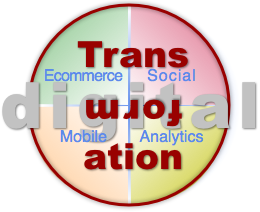 Chief digital officers and transformation will go hand in hand as the position and its competencies take shape over the next few years. Historically, commercial, government and nonprofit enterprises, when faced with profound business change or technology disruption, respond by elevating new types of leader to the “C” level. Chief Knowledge Officer, Chief Process Officer, Chief Ecommerce Officer and the like become de rigeur for a few years and fade, either because the new disruption proved less sustainable than anticipated or because the competency became subsumed by a more core function. Chief digital officers and transformation will go hand in hand as the position and its competencies take shape over the next few years. Historically, commercial, government and nonprofit enterprises, when faced with profound business change or technology disruption, respond by elevating new types of leader to the “C” level. Chief Knowledge Officer, Chief Process Officer, Chief Ecommerce Officer and the like become de rigeur for a few years and fade, either because the new disruption proved less sustainable than anticipated or because the competency became subsumed by a more core function.
I predict that the Chief Digital Officer (CDO) will play a vital role at most organizations through 2020, but the organizational role will be fleeting as a standalone. “Digital” will integrate all functions and be the standard eventually, but organizations require intense transformation to get there, so the CDO will play a crucial role. My ongoing analysis of social business adoption indicates that the market for social business transformation will hit an inflection point by 2017, as more advisors and executives see the power and results of digital […]
 [UPDATED] Social business strategy use cases represent scenarios in which most organizations find themselves, and they reflect some of the choices of which CDOs, CMOs and CEOs may use as they plan to evolve their enterprises in order to either improve returns or simply remain relevant in volatile markets. [UPDATED] Social business strategy use cases represent scenarios in which most organizations find themselves, and they reflect some of the choices of which CDOs, CMOs and CEOs may use as they plan to evolve their enterprises in order to either improve returns or simply remain relevant in volatile markets.
Social business strategy is inherently transformational to large organizations whether they are in commercial, nonprofit or government sectors. All organizations are hives of people communicating and collaborating to execute business processes (“work”). Digital social technologies have reduced the cost of communication (and therefore much collaboration and work) by an order of magnitude (roughly ten times). Collaboration and innovation, before digital social technologies, were slow and expensive. Now they are very fast and inexpensive—when organizations learn how to use them. Organizations that learn how are more responsive to their constituents and customers, so the market rewards them—and will increasingly punish those that lag too far.
These use cases focus on building enterprise social business internal capability, and they are also helpful to consider when selecting social business advisors. Please […]
![Transform the Enterprise [Social Business Team Building] case5](http://rollyson.net/wp-content/uploads/2013/04/sbtb5.png) Transform the Enterprise is almost always initiated by the CEO’s office, the CDO, the board of directors or other strategic body. Its defining characteristic is enterprise transformation, using social business as a key enabler. Some of its common business contexts are: the hiring of a (new) CDO (Chief Digital Officer), which is itself a commitment to use social business for transformation; a merger, major acquisition or sale whose focus is to redefine the enterprise; “pervasive social business” that results when several of the enterprise’s brands have had some social business success that the executive team wants to scale; scaling enterprise 2.0 social collaboration technologies; self-disruption to create a new level of competitiveness. Transform the Enterprise is almost always initiated by the CEO’s office, the CDO, the board of directors or other strategic body. Its defining characteristic is enterprise transformation, using social business as a key enabler. Some of its common business contexts are: the hiring of a (new) CDO (Chief Digital Officer), which is itself a commitment to use social business for transformation; a merger, major acquisition or sale whose focus is to redefine the enterprise; “pervasive social business” that results when several of the enterprise’s brands have had some social business success that the executive team wants to scale; scaling enterprise 2.0 social collaboration technologies; self-disruption to create a new level of competitiveness.
In 2013, digital marketing and firm executives are thinking about building their internal teams to provide more continuity and scale. Transform the Enterprise also focuses on the right side of the Social Business Life Cycle, specifically on Scale and Integrate. At this point, the enterprise usually has a panoply of social business or social media resources that it wants to knit together into a […]
 Anonymity, Marketing and Predicting the Future shows that, although each culture has its own concepts of “anonymity” and “marketing,” anonymity will prove to have been a temporary phenomenon in most human cultures because communications technologies are counteracting it. Moreover, based on my studies of and experience with sociology, evolutionary psychology and technology, I observe that 20th century marketing is grounded in anonymity, so we can predict the future of marketing by exploring anonymity and its relationship to marketing. Anonymity, Marketing and Predicting the Future shows that, although each culture has its own concepts of “anonymity” and “marketing,” anonymity will prove to have been a temporary phenomenon in most human cultures because communications technologies are counteracting it. Moreover, based on my studies of and experience with sociology, evolutionary psychology and technology, I observe that 20th century marketing is grounded in anonymity, so we can predict the future of marketing by exploring anonymity and its relationship to marketing.
In brief, marketing’s influence is most poignant when anonymity is high and the marketing “target” is ignorant of the product/service and how to use it. In this scenario, the target is most open marketing’s influence. Read on to learn how marketing is related to anonymity, where anonymity is going and how marketing can transform to strengthen its influence.
Marketing organizations that do not transform will be sidelined because anonymity is dissipating fast.
[…]
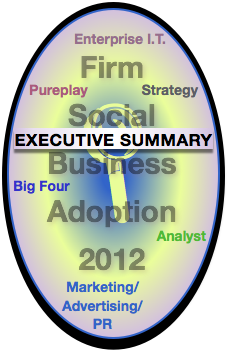 Advisory & Services Firm Social Business Adoption 2012 is a research survey that looks at social business advisory/consulting firms in a new way. Using quantitative methods, I compared consultancies according to the needs of clients who want to transform their organizations with social business. The twelve metrics measure firms’ performance in business impact, sociality, and transformation areas, and they rank firms within firm categories and overall. Advisory & Services Firm Social Business Adoption 2012 is a research survey that looks at social business advisory/consulting firms in a new way. Using quantitative methods, I compared consultancies according to the needs of clients who want to transform their organizations with social business. The twelve metrics measure firms’ performance in business impact, sociality, and transformation areas, and they rank firms within firm categories and overall.
Now prospective clients can compare Strategy firms, Big Four firms, Agencies, Analysts, Enterprise IT firms, and Pureplays quantitatively. Moreover, consulting firms can use these metrics for guidance in building out their social business practices.
I launched CSRA in 2006, and we have always practiced social business as transformation. Client work in social business transformation enables me to see where the market is going, so this survey considers social business firms from that future state.
[UPDATE 8 Mar] Now available: “Executive Briefing” is even more summarized (14-slides) in two versions: Guidance for Clients and Guidance for Firms. Research survey results will be most useful if you […]
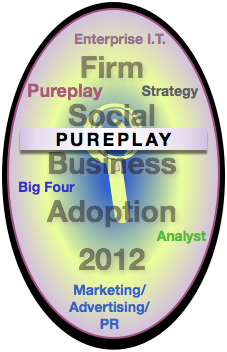 Pureplays address social business as transformation by definition because they have been launched to address emerging market needs that established players either do not yet understand or have yet to organize to address. Moreover, Pureplays are not adding social business to their existing services; they have been formed to practice social business. They are a small cohort in this research survey because they were constrained to social business and transformation as were advisory firms in other categories. Pureplays address social business as transformation by definition because they have been launched to address emerging market needs that established players either do not yet understand or have yet to organize to address. Moreover, Pureplays are not adding social business to their existing services; they have been formed to practice social business. They are a small cohort in this research survey because they were constrained to social business and transformation as were advisory firms in other categories.
Pureplay firms are often smallish startups, so they are quite limited in some areas when compared to established legacy firms as in this research survey. From a market and client perspective, Pureplays represent a vital part of the market and can offer unique capabilities; however, clients need to approach them with “eyes wide open” because the way they serve clients varies considerably.
There are thousands of social media advisory Pureplay firms that are focused on marketing and promotion. Pureplays’ capabilities are largely colored by their founders’ backgrounds. Dachis Group, SideraWorks and SocialxDesign directly […]
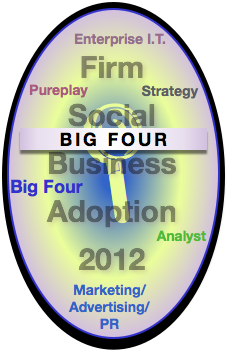 [UPDATED] The Big Four accountancies have been rebuilding their advisory practices for the past several years, and social business transformation fits with their core competencies in important ways. Like Strategy firms, they have been watching adoption and producing thought leadership on various aspects of social technologies’ relevance to business. Their approach also resembles that of strategy firms in that they have relatively low evidence of social business practice. [UPDATED] The Big Four accountancies have been rebuilding their advisory practices for the past several years, and social business transformation fits with their core competencies in important ways. Like Strategy firms, they have been watching adoption and producing thought leadership on various aspects of social technologies’ relevance to business. Their approach also resembles that of strategy firms in that they have relatively low evidence of social business practice.
Big Four firms are well positioned to evolve into social business consultancies because they have core competencies in business strategy and business process transformation. However, they will be challenged by their relative lack of core communications skills and awareness of “soft” social, people and behavioral knowledge.
Deloitte has been an early adopter of social business as a concept, perhaps because it did not shed its consulting practice in the early 2000s as all others did. PwC acquired boutique social business consultancy Ant’s Eye View in 2012, which shows its intention to integrate social business more deeply into its Customer Impact practice.
[…]
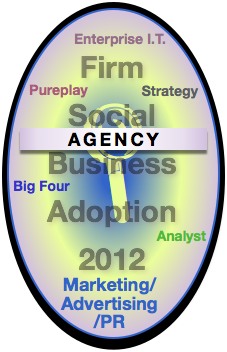 [UPDATED] Marketing, advertising and public relations (MAP) agencies have comprised the largest share of the “social” advisory and execution firms for many years. Most of the other advisory firms are relative late entrants, with the exception of some Analyst and Enterprise I.T. firms. Communication forms the core of social technologies, and MAP agencies have been pivotal in leading the growth of social media activity in their clients, many of the largest brands in the world. [UPDATED] Marketing, advertising and public relations (MAP) agencies have comprised the largest share of the “social” advisory and execution firms for many years. Most of the other advisory firms are relative late entrants, with the exception of some Analyst and Enterprise I.T. firms. Communication forms the core of social technologies, and MAP agencies have been pivotal in leading the growth of social media activity in their clients, many of the largest brands in the world.
However, this research survey argues that, although social media will remain an important portion of the total economic value produced by using social technologies, it will devolve into a minority portion. Collaboration and pervasive innovation will be the majority, which will require enterprise business process transformation. MAP agencies lack competencies in management consulting and enterprise transformation, so they are in an ambiguous situation, being the leaders in social media, a shrinking market in the medium to long term. This report shows how agencies can navigate these rapids and how their clients might best partner with them […]
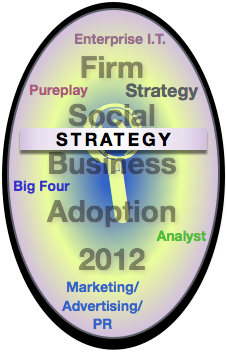 [UPDATED] Strategy firms are the most trusted names sought by CEOs and boards of directors who are reevaluating their companies’ identities, strategies and operations. Strategy firms have been making measured investments in social business over the last few years. Their knowledge of enterprise transformation is deep and broad, and they all have proprietary methodologies for most aspects of the strategy and transformation life cycle. They have deep and broad expertise in market analysis, competitive analysis corporate core competency analysis and virtually all aspects of operations. Many firms have large business transformation practices that explicitly guide clients through profound redefinition and change. [UPDATED] Strategy firms are the most trusted names sought by CEOs and boards of directors who are reevaluating their companies’ identities, strategies and operations. Strategy firms have been making measured investments in social business over the last few years. Their knowledge of enterprise transformation is deep and broad, and they all have proprietary methodologies for most aspects of the strategy and transformation life cycle. They have deep and broad expertise in market analysis, competitive analysis corporate core competency analysis and virtually all aspects of operations. Many firms have large business transformation practices that explicitly guide clients through profound redefinition and change.
Strategy firms have extensive core competencies that could enable them to offer social business strategy services. In addition, Strategy firms are significant producers of thought leadership relevant to corporate and business strategy as well as operations. Most firms field high quality management journals whose papers are written by their consultants. Many have research boutiques or even full-fledged businesses for research and thought leadership. However, they are challenged by very conservative […]
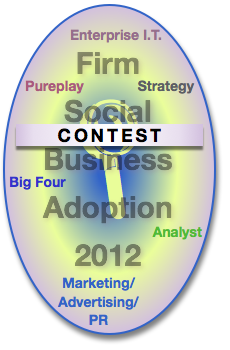 Advisory and Services Firm Social Business Adoption 2012 is publishing as individual Executive Summaries of firm category reports. These discuss relative scores of firms in each category, but they don’t disclose scores themselves. This enables us to have some fun. You can guess the highest scores in several categories and win valuable prizes! Advisory and Services Firm Social Business Adoption 2012 is publishing as individual Executive Summaries of firm category reports. These discuss relative scores of firms in each category, but they don’t disclose scores themselves. This enables us to have some fun. You can guess the highest scores in several categories and win valuable prizes!
Contest Rules
To be eligible for 1st, 2nd or 3rd prizes, all you need do is respond to four questions via the embedded survey below. You could win an Extended Analysis report of any firm in this Research Survey, or even commission your own Extended Analysis report! For five minutes of your time.
I will award prizes two days after the last Executive Summary publishes (see the Research Survey microsite for dates). However, the first person who responds with the correct answer wins that prize. This introduces some risk for people who just wait until the end! You should also know that I reserve the right to change any of the rules or prizes without notice except on this […]
|
|
 Chief digital officers and transformation will go hand in hand as the position and its competencies take shape over the next few years. Historically, commercial, government and nonprofit enterprises, when faced with profound business change or technology disruption, respond by elevating new types of leader to the “C” level. Chief Knowledge Officer, Chief Process Officer, Chief Ecommerce Officer and the like become de rigeur for a few years and fade, either because the new disruption proved less sustainable than anticipated or because the competency became subsumed by a more core function.
Chief digital officers and transformation will go hand in hand as the position and its competencies take shape over the next few years. Historically, commercial, government and nonprofit enterprises, when faced with profound business change or technology disruption, respond by elevating new types of leader to the “C” level. Chief Knowledge Officer, Chief Process Officer, Chief Ecommerce Officer and the like become de rigeur for a few years and fade, either because the new disruption proved less sustainable than anticipated or because the competency became subsumed by a more core function.
 [UPDATED] Social business strategy use cases represent scenarios in which most organizations find themselves, and they reflect some of the choices of which CDOs, CMOs and CEOs may use as they plan to evolve their enterprises in order to either improve returns or simply remain relevant in volatile markets.
[UPDATED] Social business strategy use cases represent scenarios in which most organizations find themselves, and they reflect some of the choices of which CDOs, CMOs and CEOs may use as they plan to evolve their enterprises in order to either improve returns or simply remain relevant in volatile markets.![Transform the Enterprise [Social Business Team Building] case5](http://rollyson.net/wp-content/uploads/2013/04/sbtb5.png) Transform the Enterprise is almost always initiated by the CEO’s office, the CDO, the board of directors or other strategic body. Its defining characteristic is enterprise transformation, using social business as a key enabler. Some of its common business contexts are: the hiring of a (new) CDO (Chief Digital Officer), which is itself a commitment to use social business for transformation; a merger, major acquisition or sale whose focus is to redefine the enterprise; “pervasive social business” that results when several of the enterprise’s brands have had some social business success that the executive team wants to scale; scaling enterprise 2.0 social collaboration technologies; self-disruption to create a new level of competitiveness.
Transform the Enterprise is almost always initiated by the CEO’s office, the CDO, the board of directors or other strategic body. Its defining characteristic is enterprise transformation, using social business as a key enabler. Some of its common business contexts are: the hiring of a (new) CDO (Chief Digital Officer), which is itself a commitment to use social business for transformation; a merger, major acquisition or sale whose focus is to redefine the enterprise; “pervasive social business” that results when several of the enterprise’s brands have had some social business success that the executive team wants to scale; scaling enterprise 2.0 social collaboration technologies; self-disruption to create a new level of competitiveness. Anonymity, Marketing and Predicting the Future shows that, although each culture has its own concepts of “anonymity” and “marketing,” anonymity will prove to have been a temporary phenomenon in most human cultures because communications technologies are counteracting it. Moreover, based on my studies of and experience with sociology, evolutionary psychology and technology, I observe that 20th century marketing is grounded in anonymity, so we can predict the future of marketing by exploring anonymity and its relationship to marketing.
Anonymity, Marketing and Predicting the Future shows that, although each culture has its own concepts of “anonymity” and “marketing,” anonymity will prove to have been a temporary phenomenon in most human cultures because communications technologies are counteracting it. Moreover, based on my studies of and experience with sociology, evolutionary psychology and technology, I observe that 20th century marketing is grounded in anonymity, so we can predict the future of marketing by exploring anonymity and its relationship to marketing. Advisory & Services Firm Social Business Adoption 2012 is a research survey that looks at social business advisory/consulting firms in a new way. Using quantitative methods, I compared consultancies according to the needs of clients who want to transform their organizations with social business. The twelve metrics measure firms’ performance in business impact, sociality, and transformation areas, and they rank firms within firm categories and overall.
Advisory & Services Firm Social Business Adoption 2012 is a research survey that looks at social business advisory/consulting firms in a new way. Using quantitative methods, I compared consultancies according to the needs of clients who want to transform their organizations with social business. The twelve metrics measure firms’ performance in business impact, sociality, and transformation areas, and they rank firms within firm categories and overall. Pureplays address social business as transformation by definition because they have been launched to address emerging market needs that established players either do not yet understand or have yet to organize to address. Moreover, Pureplays are not adding social business to their existing services; they have been formed to practice social business. They are a small cohort in this research survey because they were constrained to social business and transformation as were advisory firms in other categories.
Pureplays address social business as transformation by definition because they have been launched to address emerging market needs that established players either do not yet understand or have yet to organize to address. Moreover, Pureplays are not adding social business to their existing services; they have been formed to practice social business. They are a small cohort in this research survey because they were constrained to social business and transformation as were advisory firms in other categories. [UPDATED] The Big Four accountancies have been rebuilding their advisory practices for the past several years, and social business transformation fits with their core competencies in important ways. Like Strategy firms, they have been watching adoption and producing thought leadership on various aspects of social technologies’ relevance to business. Their approach also resembles that of strategy firms in that they have relatively low evidence of social business practice.
[UPDATED] The Big Four accountancies have been rebuilding their advisory practices for the past several years, and social business transformation fits with their core competencies in important ways. Like Strategy firms, they have been watching adoption and producing thought leadership on various aspects of social technologies’ relevance to business. Their approach also resembles that of strategy firms in that they have relatively low evidence of social business practice. [UPDATED] Marketing, advertising and public relations (MAP) agencies have comprised the largest share of the “social” advisory and execution firms for many years. Most of the other advisory firms are relative late entrants, with the exception of some Analyst and Enterprise I.T. firms. Communication forms the core of social technologies, and MAP agencies have been pivotal in leading the growth of social media activity in their clients, many of the largest brands in the world.
[UPDATED] Marketing, advertising and public relations (MAP) agencies have comprised the largest share of the “social” advisory and execution firms for many years. Most of the other advisory firms are relative late entrants, with the exception of some Analyst and Enterprise I.T. firms. Communication forms the core of social technologies, and MAP agencies have been pivotal in leading the growth of social media activity in their clients, many of the largest brands in the world. [UPDATED] Strategy firms are the most trusted names sought by CEOs and boards of directors who are reevaluating their companies’ identities, strategies and operations. Strategy firms have been making measured investments in social business over the last few years. Their knowledge of enterprise transformation is deep and broad, and they all have proprietary methodologies for most aspects of the strategy and transformation life cycle. They have deep and broad expertise in market analysis, competitive analysis corporate core competency analysis and virtually all aspects of operations. Many firms have large business transformation practices that explicitly guide clients through profound redefinition and change.
[UPDATED] Strategy firms are the most trusted names sought by CEOs and boards of directors who are reevaluating their companies’ identities, strategies and operations. Strategy firms have been making measured investments in social business over the last few years. Their knowledge of enterprise transformation is deep and broad, and they all have proprietary methodologies for most aspects of the strategy and transformation life cycle. They have deep and broad expertise in market analysis, competitive analysis corporate core competency analysis and virtually all aspects of operations. Many firms have large business transformation practices that explicitly guide clients through profound redefinition and change. Advisory and Services Firm Social Business Adoption 2012 is publishing as individual Executive Summaries of firm category reports. These discuss relative scores of firms in each category, but they don’t disclose scores themselves. This enables us to have some fun. You can guess the highest scores in several categories and win valuable prizes!
Advisory and Services Firm Social Business Adoption 2012 is publishing as individual Executive Summaries of firm category reports. These discuss relative scores of firms in each category, but they don’t disclose scores themselves. This enables us to have some fun. You can guess the highest scores in several categories and win valuable prizes!